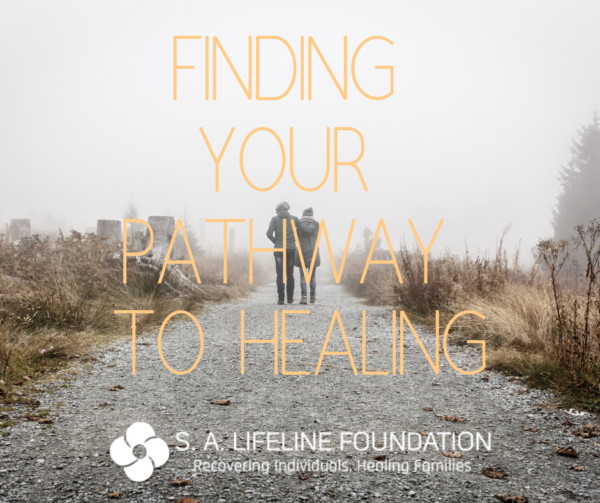Hopefully you have heard the exciting news that Dr. Barbara Steffens will be speaking at the S.A.Lifeline Fall Conference on September 21st, 2019. About a decade ago, Dr. Steffens’s research transformed the treatment of partners of sex addicts from a co-addict model to a trauma model. For many of us in the S.A.Lifeline community, we can thank Dr. Steffens for the compassionate, informed, trauma-sensitive care we have received from qualified therapists as well as our 12 step community. Her book, Your Sexually Addicted Spouse, is an excellent resource on trauma recovery. As I have read this book over the past weeks, I have been reminded of the overpowering effects of trauma on early recovery, and the desperate need for safety before any healing can begin.

Dr. Steffens not only educates her readers on the overpowering impact of betrayal trauma on the brain and body, but she also outlines a clear path for healing. The following pathway is adapted from p.109-111 of her book.
Here are some questions to consider:
Where are you on the continuum today?
What should you be focusing on in the stage you are currently at?
What might be your next step toward healing?
Initial Discovery and Crisis:
- Find initial support immediately
- Re-establish safety
- Consider controlled, supportive environments for disclosure; consider polygraph testing
- Get tested for sexually transmitted diseases
- Practice good self-care
Find/Build Good Support System & Re-establish Safety
- Family and/or friends if “safe”
- Clergy if “safe”
- Counselor (sex addiction and trauma specialist, if possible)
- SAL 12 Step Support Group
- Doctor’s or psychiatrist’s help if struggling with depression or anxiety
- If you feel suicidal, seek help immediately
Create Boundaries to Re-establish Safety
- Possible sexual boundaries with your partner
- Possible temporary separation from your partner—in-home or geographical
- Emotional boundaries—detaching with love
- Other boundaries as needed
Balanced Self-Care
- Mental/emotional self-care
- Physical self-care
- Spiritual self-care
Boundaries Between Yourself and Trauma
- Use self-care to build a boundary from the pain
- Learn and utilize self-soothing techniques
- Eliminate cognitive distortions
- Eliminate negative self-talk
- Use healthy self-talk
Begin Emotional Processing and Grieving
- Recognize and process your feelings
- Acknowledge and grieve your losses and the consequences they produced in your life
- For some, face and adapt to separation or divorce
- Alter your attachment to what you’ve lost by letting it go and saying goodbye
- Develop resiliency
Use Grieving and Processing Methods to Heal
- Externalize the problem by sharing your story
- Renegotiate the trauma with a counselor’s help
- Consider nature-based, expressive, or music therapy
- Consider body therapies when trauma manifests in physical symptoms
- Consider EMDR
Continue Emotional Processing
- You will know when the pain has lost its power and you are free to let it go and move on
Develop Personal Empowerment
- Continue and expand healthy boundaries
- Develop solid grounding
- Strengthen self-awareness
- Develop healthy communication skills
- Develop healthy conflict management skills
- Reframe yourself as a survivor rather than a victim
Integration and Transformation Resulting from Post-Traumatic Growth
- Integrate the trauma into your larger life story
- Consider forgiveness
- Find new hope by transforming the pain into a positive life purpose
No matter where you are on your pathway, there are steps you can take today to move toward a direction of wholeness and healing.
As I have reviewed this list, I have been amazed at how my SAL12Step sponsor and family have offered invaluable support and accountability every step of the way.
Keep working it, it works, and you are worth it!







Great post! As I look back to when I started my recovery, I can see so much progress when I thought I was stagnant. Recovery takes time and when you let it happen. It is a beautiful thing. I am not “recovered” and don’t expect to be, but I can look back now and see the progress and the peace I have attained by doing recovery work. Thanks for the reminder!
Thank you so much for your website and this posting! Wonderful help and wisdom!!! Just like the previous reply I agree that there is measurable progress in my life and thoughts and self talk and also in our marriage. This posting is so very helpful to look at and chart the growth. It has been a very difficult journey of 25 years yet, it was not constant turmoil as some days can make me think. My husband is sober and in recovery that has been measured/verified with annual polygraphs as well as new learned ways to deal with emotions(thank you for defining that on the relapse vs recovery article). For me, I have a very stepped up and active program, and recovery these days, thanks to my face to face meetings and telemeetings. No Sanon/Cosa S A lifeline here yet, so I go to Alanon and do recovery face to face there (grateful for that)as well as telemeetings and zoom meetings. To all my sisterhood traveling this journey, I want to say –I love you–you are not alone, there is help and it does get better, one day at a time!